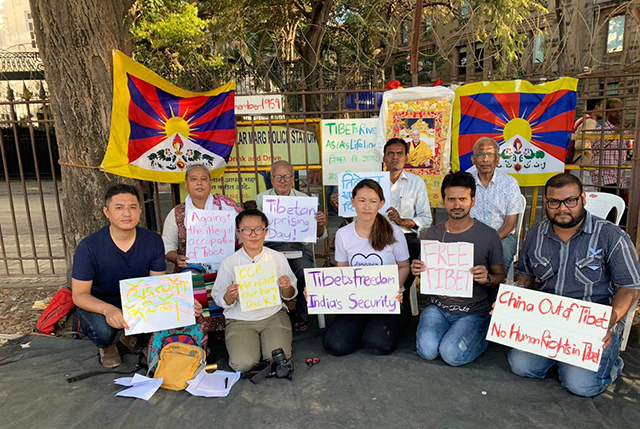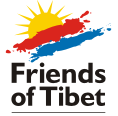Commemoration of 61st Tibetan National Uprising Day in Mumbai (March 10, 2020)
⋯
Tenzin Dekyong, President of the Mumbai Tibetan Residents' Association gave an introductory speech. She said: "We the younger generation Tibetans must never forget the historic importance of the day and pass on our story to the generations to come".
This was followed by a speech by CA Kallianpur, long-time supporter and the National Coordinator of Friends of Tibet. He said that "Tibet has a very strong case for Independence and Tibetans must never give up." He further said: "This being the 61st national uprising day, I do not have to tell the young students about the sacrifices made by the elders on this day back in 1959 when the entire people of Lhasa in Tibet rose up against the Chinese occupiers. I have no is hesitation to say this even after 35 years of my involvement with the issue. Tibetan government-in-exile's position may be different; we have no quarrel with that. The Dalai Lama's position is difficult as he has his own compulsions. But it is the duty of the youngsters like you to keep the struggle alive".
Thinley Choedon, a Mumbai University student running Students for a Free Tibet chapter in Mumbai city hosted the programme.
On the 10th of March 1959 the Tibetan people reasserted their Tibetan independence suffering almost nine years of foreign domination. Foreign rule, alas, still continues in Tibet but I know that I am proud to know that the spirit of our people remains uncrushed and unshaken in their resolve to fight on till independence is regained. I know that the struggle, which began a few years ago is still being waged in Tibet against the invader and the oppressor who masquerades under the name and guise of 'liberator'. I can confidently assert that the civilized world is, every day, becoming more and more aware of those, who, in the name of liberation, are crushing out the freedom of defenceless neighbours.
The world has been made aware of the terrible happening in Tibet by the two illuminating reports of the International Commission of Jurists. These reports have pointed out that the Chinese have, ruthlessly, trampled on the elementary human rights of our people, that thousands of our people have been killed for the only reason that they asserted their right to live in the manner they desired to do, following their cultural and religious heritage. The reports have further pointed out that the Chinese have been guilty of genocide by reason of their killing many Tibetans with the intent of destroying the Tibetan religion and by deporting thousands of children to China.
The sympathy aroused in the world was evidenced by the fact that the United Nations by their Resolution in 1959 appealed for the cessation of practices depriving the Tibetan people of their fundamental human rights and their traditional autonomy. I assert that it is not autonomy but independence of which we have been deprived. Anyway, so far as the Chinese are concerned, the appeal fell on deaf ears. Things have become worse as is clear from the steady and unceasing flow of refugees from Tibet.
As further evidence of that sympathy, we had in New Delhi in April 1960, a Convention by representatives of 19 nations, convened by the respected Indian leader, Shri Jayaprakash Narayan. This Convention brought to the notice of the world the happenings in Tibet. The Afro-Asian Council, established by the Convention sent its representatives to New York to support the Tibetan appeal in the World Assembly in 1960. On behalf of the Tibetan people, I express my sincere thanks to the Afro-Asian Council for the great interest they have taken in our cause and the valuable help they have rendered. I am glad to learn that the Council is deputing Shri Pushottam Trikamdaas to be in New York when the Assembly reconvenes.
Shortly the question of Tibet will come up for discussion in the plenary session of the U.N. Assembly. I appeal to the sponsors and to the Assembly to get the Chinese to vacate their aggression and to help restore the independence of Tibet. Any half measures will be of little avail. Our gratitude is due to the federation of Malaya, Thailand, Ireland and El Salvador for sponsoring our cause. May I appeal to India, our great neighbour, which has given refuge to thousands of us, to lend its powerful support to our cause.
Recently the United Nations passed a resolution on the declaration of the grant of independence to colonial possessions. Our country, which was till recently independent, has been reduced to the status of a colonial possession. We cannot in any event be denied the right to self-determination.
I am aware that the Tibetan people, inside Tibet, are undergoing the travail, that foreign rule brings in its wake. I appeal to them to keep up their spirit and their resolve to regain their independence. On my part, I need hardly say, I am far from happy to be away from my country and my beloved and brave people. I want to tell them that I share with them their hopes and their agony.
To the thousands of my countrymen in India, Nepal, Bhutan and Sikkim, I want to say that a heavy responsibility devolves on all of us to prepare ourselves for the day when we can return to our country and build a happier and greater independent Tibet. New Tibet will need thousands of trained and skilled men and women, necessary to bring Tibet in consonance with the spirit of democracy without losing our cultural and religious heritage or our soul.
During the Chinese occupation before I was compelled to leave Tibet, the Kashag and myself made efforts to introduce land and other reforms in Tibet but as is well known our efforts were blocked by the Chinese. The Communists are today forcing what they call reforms down the throats of our people. I have given careful consideration to these so-called reforms and I have come to the conclusion that at the end of the reforms the Tibetan people will be reduced to the state of mental and economic serfdom.
Such reforms are not in consonance with the Charter of the U.N. nor with the Universal Declaration of Human Rights. The reforms that I visualise must, while preserving the intellectual, moral and religious freedom, bring about an equitable distribution of wealth of the country. In this connection I shall repeat what I said sometime back in Dalhousie: "In order to make Tibet a rich, strong and vigorous nation, the special privileges and the large estates enjoyed, whether by monasteries or aristocratic families, will have to go and every one will have to learn and live with and help the common people." I further said, "Changes must come in all spheres. The government structure will also have to undergo far-reaching reforms so that the people are more intimately associated with the policies of the government and the administration of the country. The task and responsibility of establishing improved political and religious institutions lies upon all of us."
I am preparing a draft of the constitutional and economic structure, which I visualise for our country and I shall place it shortly before the representatives of the Tibetan people in India and neighbouring countries for their consideration. Ultimately it will be the whole Tibetan people will have to decide.
The world has become very rightly concerned by recent murders in the Congo. I join my voice in condemning these murders whether in the Congo or in Algeria or elsewhere. I would, however, ask the world not to forget that thousands of Tibetans have been and are being killed for the only reason that they refused to accept foreign domination.
I want to remind my countrymen inside and outside Tibet that God's ways are inscrutable and the travail of Tibet cannot be to no purpose. The cause of Truth and Justice must prevail and out of this night of horror and suffering a bright day for Tibet and its people is bound to dawn.
I want to express my deep gratitude to India, Bhutan, Sikkim and Nepal for the hospitality and the kindness in which we have received from these neighbours of ours. I must also express my gratitude to the various international and Indian institutions and individuals, who have been given generous aide for the relief of our refugees. Since refugees are still pouring in I shall appeal to everyone to continue to help us in the same generous way they have done so far.
Finally, I request my people to join me in my prayer for peace in the world.
The Dalai Lama
Friends of Tibet, PO Box 16674, Mumbai 400050, India.
Report: Friends of Tibet (Mumbai)
Photography: Students for a Free Tibet

MUMBAI: Amid "ChineseCovid19" aka "Wuhan Virus" outbreak and panic, a handful of committed Tibetans and their supporters came forward to commemorate the 61st Tibetan National Uprising Day on March 10, 2020 in Mumbai. At this event organised jointly by the Mumbai Tibetan Residents' Association, Students for a Free Tibet and Friends of Tibet, a small number of people gathered at the Azad Maidan in the heart of the Mumbai city to join the worldwide community of Tibet supporters and in solidarity with those in exile and inside Tibet — living and suffering under the Chinese rule. Together they sang the Tibetan and Indian national anthems and distributed printed materials to general public informing them about the plight of the Tibetan people and their suffering.
⋯
1961 Statement of His Holiness the Dalai Lama on the Second Anniversary of the Tibetan National Uprising Day
March 10, 1961
⋯
![]()
Photo Gallery
![]()
Email: freedom@friendsoftibet.org Web: www.friendsoftibet.org
